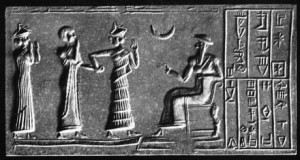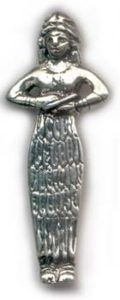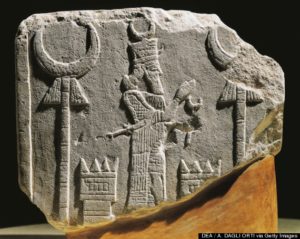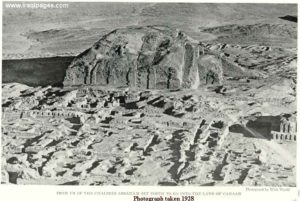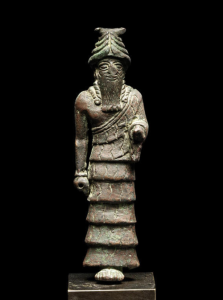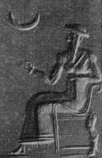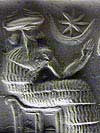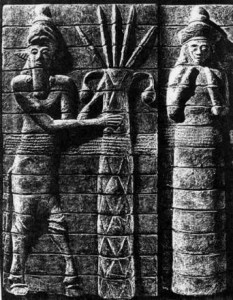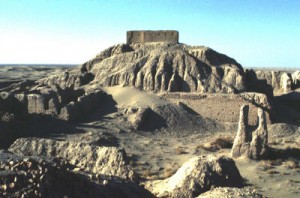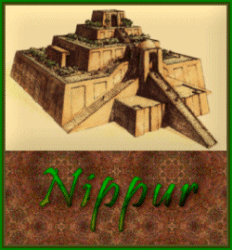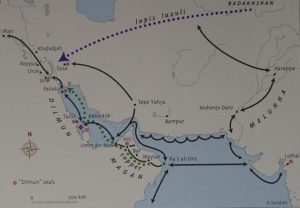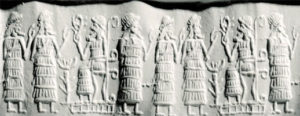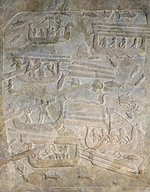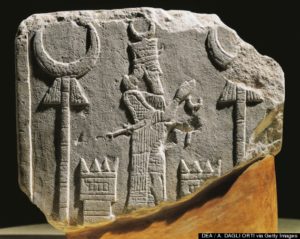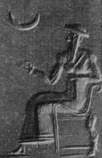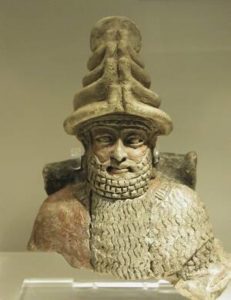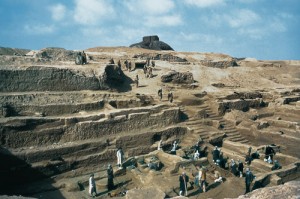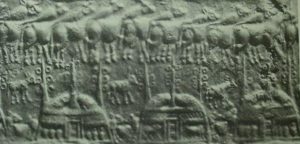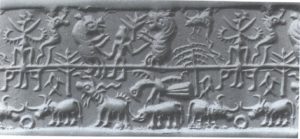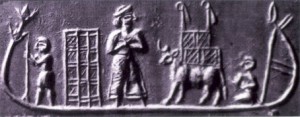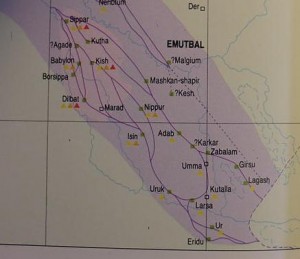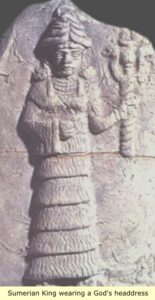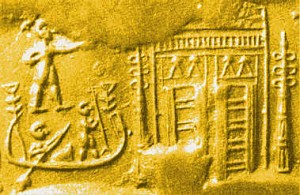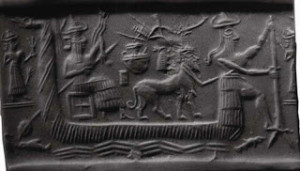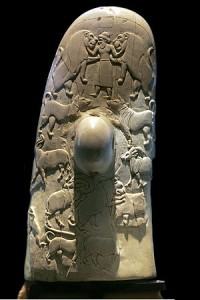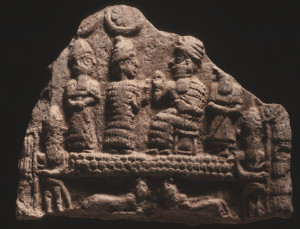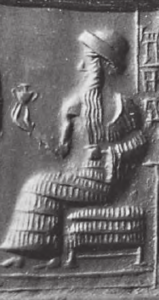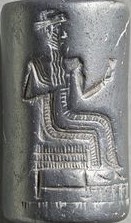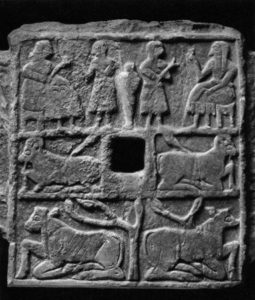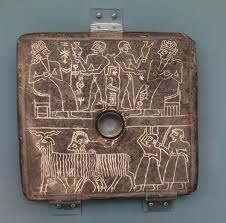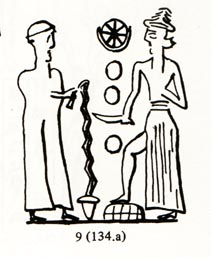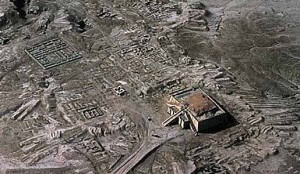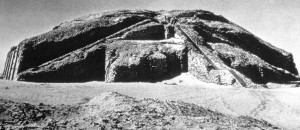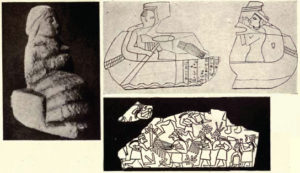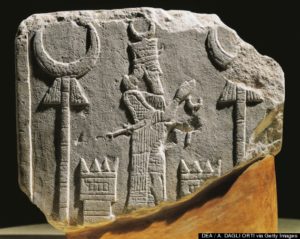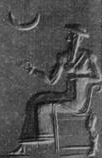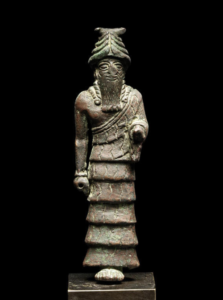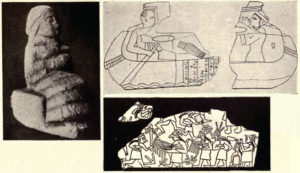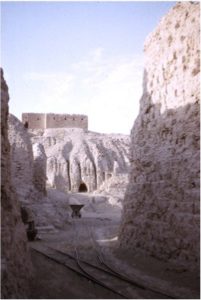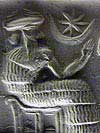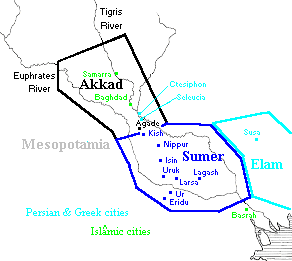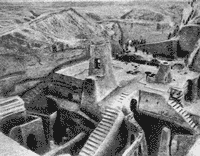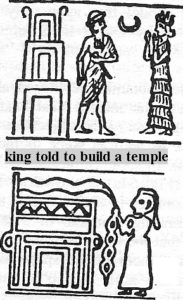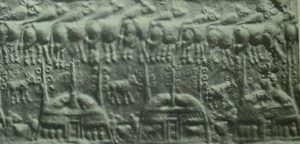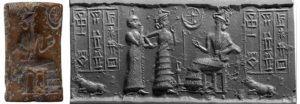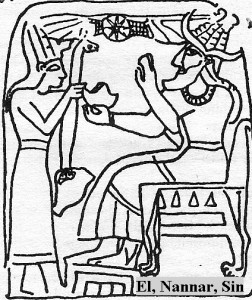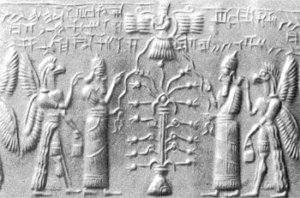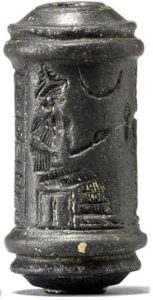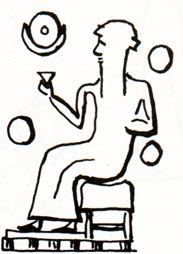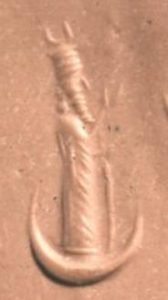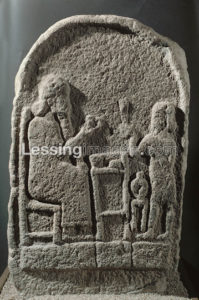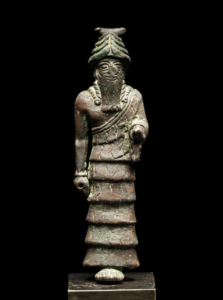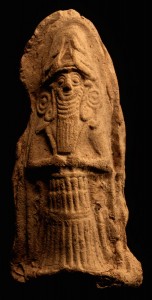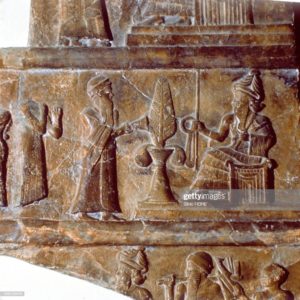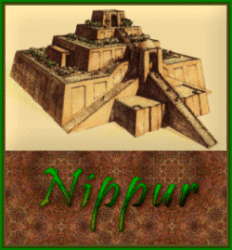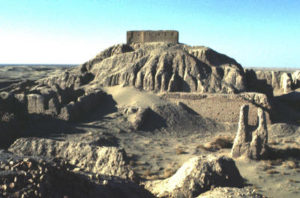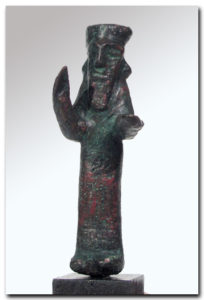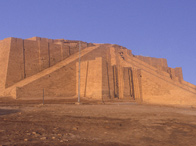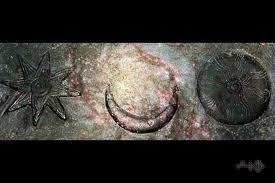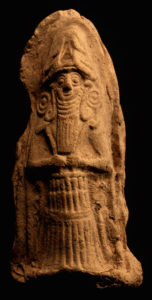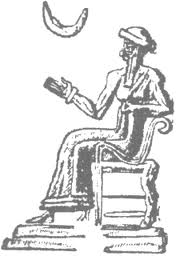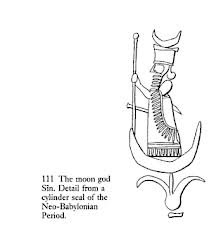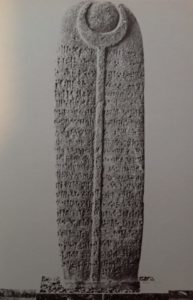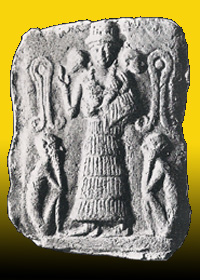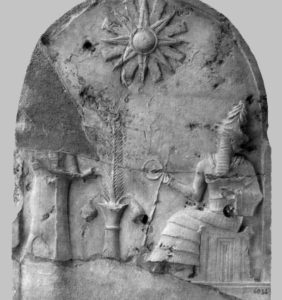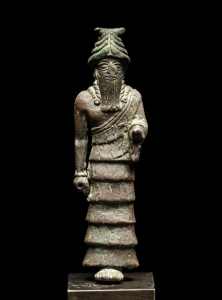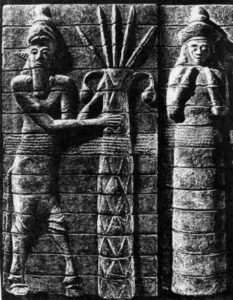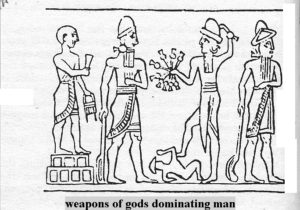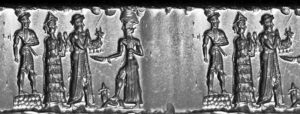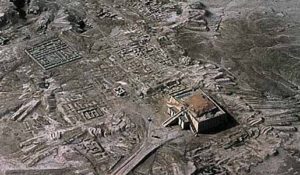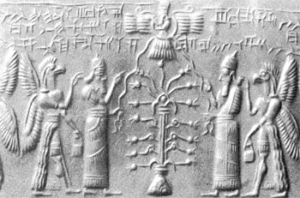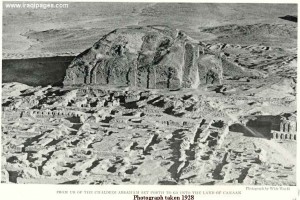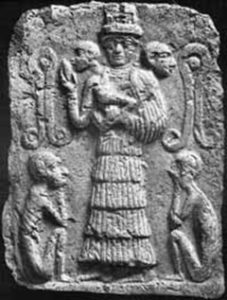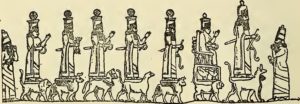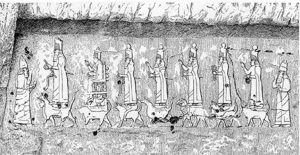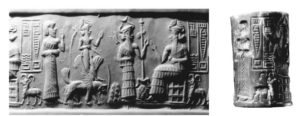How the Moon Lord Found the Lady of Dreams
http://www.gatewaystobabylon.com/myths/texts/retellings/nannin.htm
(Texts: All Artifacts, Color Coding, & Writings in Bold Type With Italics Inside Parenthesis, are Added by Editor R. Brown, not the Authors, Translators, or Publishers!)
(gods in blue)
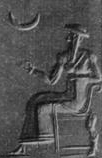 (Nanna / Nannar, patron god of Ur, & his Moon Crescent)
(Nanna / Nannar, patron god of Ur, & his Moon Crescent)
When Nanna (Nannar / Sin) the Moon, the firstborn son of Enlil and Ninlil,
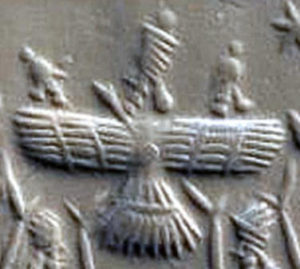 (Enki, Sky-God Anu, & Lord Air Enlil in alien sky-disc)
(Enki, Sky-God Anu, & Lord Air Enlil in alien sky-disc)
Lord Air (Enlil) and Lady Air (Ninlil), appeared in the skies, he, the young lord who was An’s (Anu’s) shining Torch,
by ever renewing himself and illuminating primeval darkness, brought along Time,
the cosmic Measure that enables the contemplation of Eternity through
the little and great facts that shape up with Meaning our lives’ lows and highs.
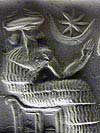 (Nannar, Enlil‘s son, & his Moon Crescent symbol, daughter Inanna‘s 8-pointed star symbol)
(Nannar, Enlil‘s son, & his Moon Crescent symbol, daughter Inanna‘s 8-pointed star symbol)
For as Nanna moved slowly over the night skies changing from waxing to waning glow,
and opening the doors of heaven to let in and out days, months and years always to return,
life’s heartbeat synchronized in perfect harmony with the Moon’s shine:
tides, the coming of spring floods to renew the land, the growth of reeds, the breathing in and out of all greens,
abundance of milk, cheese and cream and, most of all, the sacred blood of womanhood.
So Nanna the Moon was at once young and old,
bringing Rest to the land and the living, dreams and the wildest fantasies.
Much loved and feared by some, Nanna’s shine made everything equally far and near,
close by and yet mysteriously remote.
His was a strangeness both intimate and frightening, for his coming brought either sweet dreams or weird,
challenging nightmares to play during slumber.
But if one chose to, Nanna would also bestow vigilance and illumination for the diligent student of the Soul’s mysteries.
One of such kind was a young Anunnaki Maiden called Ningal.
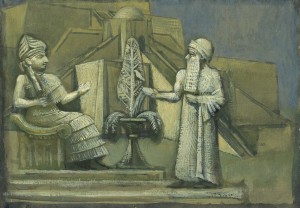 (Ningal, Nannar‘s spouse, & a giant semi-divine king)
(Ningal, Nannar‘s spouse, & a giant semi-divine king)
Young Ningal lived out in the marshlands close to the ancient settlement of Eridu (Enki‘s city),
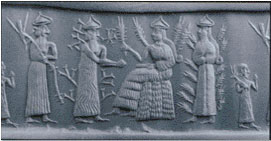 (Enlil, Haia, Ningikuga / Nisaba, & Ninlil, an unidentified)
(Enlil, Haia, Ningikuga / Nisaba, & Ninlil, an unidentified)
the beloved daughter of Ningikuga, the Goddess of Reeds, and Enki, the God of Magic, Crafts and Wisdom.
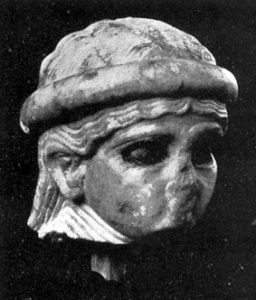 (Ningal, spouse to giant alien Nannar, patron goddess of Ur)
(Ningal, spouse to giant alien Nannar, patron goddess of Ur)
Slim, black-haired Ningal of eyes darker than a moonless night was quiet only in appearance,
because inwards she had a deep, sensual, vibrant intensity and gift to unveil the language of the Unknown
revealed in images, age-old legends, poetry and most of all, in dreams.
She was naturally spontaneous yet reserved in many ways.
Dream interpretation was her gift, and this was no easy talent to have or share.
It is so because a dream expresses in images the inside weaving of life through symbolic imagery,
as well as the unseen reverse of outer life’s weaving.
Ningal had learnt (many times the hard way) that to find the true meaning of a dream it was necessary
to keep a balance between the outer images she received, to find out whether they were part
of the Memory of the Land since the beginning of times or not,
check whether the images came from the unknown and the known to her,
to finally examine her inner perception of these images
so that the right clues for healing and wholeness could be found within and without the dream.
Also, insights achieved by dream divining brought along laughter as much as tears,
when knowledge flared up to the highest heights or descended to the lowest depths like shooting star.
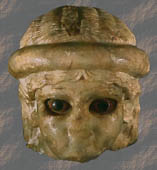 (Ningal, goddess looked after by mixed-breed high-priests, as did Terah, Biblical Abraham’s father in Ur)
(Ningal, goddess looked after by mixed-breed high-priests, as did Terah, Biblical Abraham’s father in Ur)
Deep down Ningal knew though that despite the tears, she could not bear not to know.
And that perhaps Wisdom for her meant the smile beyond the tears.
Since Ningal could remember, in the magical world of the marshlands,
where islands came out of the deepest blue waters fringed with date and palm trees,
she would follow Nanna’s progression upon the night skies.
(Ninsun, giant semi-divine son-king Gudea, his goddess spouse Inanna, & her father Nannar, god of Ur)
A sense of wonder, awe and mystery she had, whenever she saw the Moon’s shine reflecting on the waters
and felt in her body, in her mood changes, in her soul the full impact of the Silvery Lord’s passage.
(Nisaba / Ningikuga, Goddess of Reeds, Master Scribe of the gods)
Mother Ningikuga would nod, but not say a word.
She, the wise Goddess of Reeds, Sovereign of the Marshlands, Enki’s dear friend (lover), and the diligent Weaver
who had brought to humankind the art of binding reeds for the first ruts and temples of the land,
knew what the maiden’s natural shyness could not, would not yet reveal:
 (Ningal, giant semi-divine made king, again, & Nannar)
(Ningal, giant semi-divine made king, again, & Nannar)
Ningal had fallen in love with Nanna.
Thus Ningikuga watched over Ningal, respected the girl’s silence.
Soon, the Wise Friend of Enki knew, Ningal would come into her full power
as a woman and young goddess of the Holy House.
Then she would be able to choose her heart’s desire, to sing to him a Bridal Song.
Bridal Songs told about a maiden’s longing for the beloved, her desire to meet him again and again,
and the anticipation of sexual pleasure of the Sacred Marriage Rites.
Ningikuga knew Ningal would soon come to her power.
Then she would know whom to choose, she would announce her choice in a love song.
Would he be Nanna (Nannar / Sin) though?
The Moon had to complete another full cycle throughout the seasons until Ningal found her voice
to address her beloved for the first time.
(Nannar & moon crescents atop his ziggurat / residence in Ur, way above the city below)
Then, one night as Nanna appeared in the skies announcing the beginning of springtime,
Ningal felt she could at last sing to Nanna her heart’s song aloud.
Would he accept her? She did not know, but sure wanted to find out!
With a growing sense of wonder, Ningal realized that she longed, but did not hurt for Nanna.
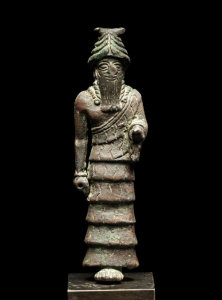 (Nannar / Sin, son to Earth Colony Commander Enlil & spouse Ninlil)
(Nannar / Sin, son to Earth Colony Commander Enlil & spouse Ninlil)
Knowing her dreams as she did, Nanna was the deepest desire of her Soul,
but would he also be the true delight of her waking hours, the True Companion of Life’s Mysteries?
She knew he had the potential to be her mate though.
Because as a lion wants only his lioness, as a tiger lies down only with his tigress,
Ningal knew she longed to make of Nanna’s arms her nest, if he only surrendered to her sweet and wild caress.
So Ningal sang:
‘ Hail Nanna, listen to Ningal
Hail Nanna, listen to your soul
Welcome please be to my company,
O light that unfolds such a wondrous World
You are the hand fitted to my glove
Needle to my thread, friend the very best
Welcome please be, Lord of my desire,
Candle to my fire, torch-bearer of my Soul’
That very night, at onset of springtime,
Nanna looked down to the marshlands and heard Ningal’s song,
saw her upraised face to the night skies, smiling at him, wooing him.
The Moon Lord started with recognition, surprise and deep felt delight.
For as long as he could remember, a Maiden had been the Silent Companion of his nightly journeys, always to return.
Her enigmatic dark eyes and beauty both cultivated and wildly untamed had chased,
challenged him with unspoken questions and promises.
He saw Ningal, he loved her more anything.
Desire so great for the young goddess felt the Moon Lord that he impetuously came down to earth to ask her:
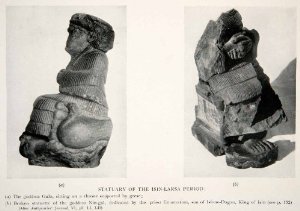 (Ningal seated upon her throne in Ur)
(Ningal seated upon her throne in Ur)
‘Ningal, silent companion of my wandering soul, the hours of the night are quickly passing by,
and soon I will disappear, only tonight to come back.
But before I leave, I beg you my lady to hear a most humble request
from the one and only who wants to be your lover and friend, the very best.
Lady of my heart, sister without peer, now that I found you, now that I met you,
now that I know after so much searching that you are my best Dream come true,
my blood sings, my heart leaps, my head spins for everything that you mean.
I cannot wait to hold you in my arms and share all body, mind and soul delights!
So if you truly love me, Ningal, as I sure love you, please do come to me in the marshes tomorrow, lady of my heart.
Do not be afraid of the dark, because my light will guide you, beloved.
Nothing will hurt you, but to ensure your full protection, do cut reeds for leggings against the sharp edges.
I’ll gather bird’s eggs for us to eat, we’ll rinse our hands in the silvery waters of the marsh.
O my sweet lady, why wait for the right time to meet, why wait so long for the wedding rites?
Beloved, come to me, but in secrecy not to upset our families.
If you truly love me as I love you, come to me tomorrow and we will make our wildest fantasies come true.’
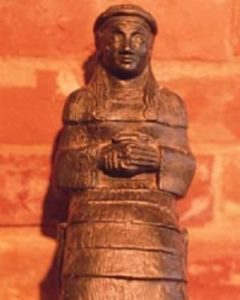 (Ningal, Enki’s beautiful daughter, Nannar’s spouse)
(Ningal, Enki’s beautiful daughter, Nannar’s spouse)
Taken by surprise, but totally overcome by sheer delight, Ningal did not think twice:
‘As you come to me today, beloved, I’ll sure come to you tonight.
You are truly the desire of my heart, I cannot not refuse the invite.
O my sweet lord, I’ve also dreamt about you for so long!
Why should we then wait for the right time to meet,
why should we wait for the wedding day, when so much joy has come our way?’
Thus, confident in the strength of being greatly loved, Ningal did as Nanna had told:
she did not say a word to mother Ningikuga about having met the young Moon Lord.
Indeed, Nanna was right: otherwise it would take much longer for both to be together in unchaperoned company.
According to the rites, not only the young ones in love,
but the two families should meet, get along and exchange the proper gifts.
So Ningal spent the day in the most joyful preparations.
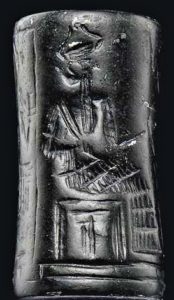 (Nanna / Nannar / Sin / Suen, / El, Enlil‘s son)
(Nanna / Nannar / Sin / Suen, / El, Enlil‘s son)
She bathed herself, she anointed herself for Nanna the Moon.
Intrigued, Mother Ningikuga’s eyes followed her through the grooming rites.
Ningikuga did raise an eyebrow and opened her mouth to utter a couple of questions but did not say a word in the end.
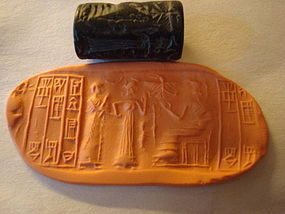 (semi-divine king, Inanna, & her mother Ningal)
(semi-divine king, Inanna, & her mother Ningal)
‘ Does she know something has changed?’ asked herself Ningal.
‘ Perhaps she does, but I won’t tell.
Mother is so very proper and fond of patterned, well-woven ways that she won’t allow me to meet Nanna tonight.
Or tomorrow and the day after without following the sacred customs.
This means that only in the next festival there will be a chance for us to be introduced formally to each other.
And the next festival is weeks away!
Sorry, mother, but this time it is my life and I’ll have the final say!’
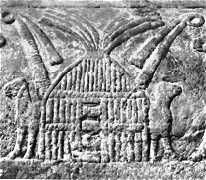 (early reed house, used by gods prior to building their ziggurats)
(early reed house, used by gods prior to building their ziggurats)
When she left the reed house that night, Ningal shone as bright as the full moon.
And as bright as the full moon Nanna came,
as loving and respectful as the king-to-be wooing the high priestess of the land.
They met in secret, but loved in the open, again and again, throughout that holy night, and more.
For night after night during that fortnight, until the time came for Nanna to go and light up the Underworld,
the Moon Lord and the Mistress of Dream Divination met and made sweet and wild love.
Then the last night came, before Nanna should return to the Underworld to light up the Depths Below.
After celebrating in joy and reverence their love, in the aftermath of shared pleasure,
Nanna kissed Ningal and held her close to whisper in her hair
the acknowledgment of the longing of his young lover’s soul:
‘ Marry me, Ningal, Inner Torch of my Life, who fills with light my darkest night..’
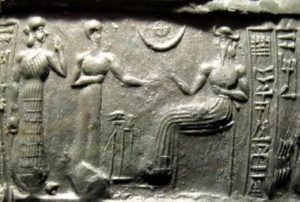 (Ningal, with semi-divine king, & Nannar)
(Ningal, with semi-divine king, & Nannar)
Delight so great filled Ningal’s heart, but Nanna’s shine was rapidly fading to the Middleworld.
Ningal knew though he was shining bright in the depths below and within her very soul
‘ On your return, beloved‘ she replied, ’ we will talk this out.’
But in the Heights Above, upon the Earth and in the Depths Below, the Great Gods knew of Nanna’s and Ningal’s secret love. The Great Gods, who know All, approved of the young lovers’ choice, but were intrigued about their interest in making secret a joy that should not be hidden. There was also the case of Nanna’s impetuousness by wooing Ningal to the marshlands without his or her parents’ agreement. Somehow Nanna’s enthusiasm had to be put on a hold before he made his intentions towards Ningal honorable and clear not only to her, but to all the Anunnaki. The Great Gods, the Anunnaki, were the Guardians of the Land, Patrons of Order and Balance, the Spiritual Sustenance to all the living. And Love, being the Life Force formed the Basis of Civilization: it should therefore be protected, cherished and preserved in all worlds. Youth was not an excuse for irresponsibility in love.
So this time darkness lasted longer, for clouds filled the night, hiding Nanna’s New Moon glow. Was it perhaps the way the Great Gods found to make impetuous Nanna come out and reveal to all his love for Ningal?
In the marshlands Ningal looked impatiently at the night skies, but had to keep quiet about her heart’s desire. She knew Nanna was out there beyond the dark, heavy clouds, and exercised patience to wait for his comeback.
A first, a second, a third moonless night passed by since the New Moon. Nanna was indeed no where to be seen, shrouded by heavy clouds. It was then that a hooded traveler came to the marsh, to Ningikuga’s and Ningal’s reed house. When the stranger crossed the threshold, greeting courteously like a prince her mother and herself, Ningal with a heightened lover’s intuition knew who he was: Nanna in disguise. Her heart leapt in joyful anticipation, but because of the secret pact they had sworn not to reveal to anyone their love she said not a word, waiting for the pattern to unfold.
After accepting food and drink Nanna from the table, the traveler told Ningal and Ningikuga of all the delicious dairy products he had diligently reserved for the one and only chosen of his heart, if she only cared to meet him later that night in the marshes.
Ningal felt her face grow hot, and her eyes searched for Ningikuga’s.
‘ Am I seeing right, but mother tonight has laughing eyes?’ Ningal asked herself silently… ’
“The way Mother looks at him, the questions she asks Nanna, I mean, the traveler…..’’
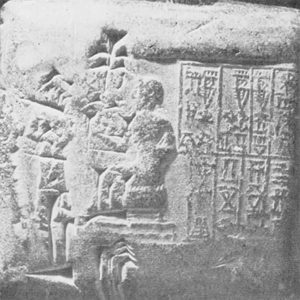 (unidentified semi-divine king & Ningal)
(unidentified semi-divine king & Ningal)
Suddenly, Ningal understood it all and her face grew even hotter. Nothing that happened in all worlds could not be known by the Great Gods. They knew of Nanna and her.
‘ O Nanna, we’ve been such fools,’ she realized.
‘ But I won’t go to the marshes and hide what cannot be hidden anymore…’
Loud, she said to the traveler, finding a new strength in her love, a new confidence in her full power of a woman and goddess:
‘”Were you Nanna the Moon God, the chosen of my heart and companion of my soul,
I would not go to the marshes with you tonight.
Not until Moon Lord has filled the rivers with the early flood to bring fertility to the land and the people,
has made grain grow in the field and new fish be in the marshes,
old and new reeds in the canebrake, stags in the forest, plants in the desert,
honey and wine in the orchards and long life to the palace.
Then and only then, in the right time and season I would move out of the marshes to the Moon’s palace of Ur,
I would share Nanna’s bed and be his Sovereign, Goddess and Queen. …”

(Ningal giant semi-divine mixed-breed king of Ur Ur-Nammau Nannar)
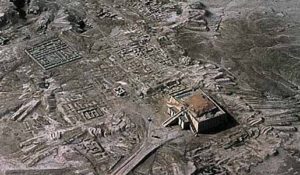 (Nannar‘s & Ningal’s) Moon’s Palace in Ur
(Nannar‘s & Ningal’s) Moon’s Palace in Ur
A charged silence followed Ningal’s statement. As her attention was totally on the hooded traveler, Ningal did not see the approving smile that shone like a beacon in Ningikuga’s face or the raised eyebrow she directed to Ningal. How would the impetuous Moon Lord (Nannar) react to Ningal’s words?
Nanna retrieved his poise, chuckled and bowed deeply in front of both ladies, addressing Ningal first:
‘ May your beloved have heeded your wise words,
daughter of the holy house, first and foremost in the Moon Lord’s soul.
You are truly the future lady of Ur… ‘
He turned then to Ningikuga:
‘ Thank you, Great Lady, for your hospitality.
And forgive me for any harm my impetuousness has caused…’
Ningikuga’s composure and humor were a sight to behold.
‘ The daughters and sons of An (Anu) are all also my own,’ she said very softly, raising her hand in a blessing.
‘ I wish you luck, Stranger, in the wooing of your lady.
With a mother’s experience and care, I tell you, young lord, love her deeply, treat her as your equal.
And when the time comes in the Sacred Marriage celebrations, share yours and her joy with all creation.
And… don’t forget you two to send me a proper invitation for the events.’
Two young faces were as delighted as embarrassed, as Ningikuga retired in style for her private chambers.
So the Lady of Dreams bound in love the impetuous Torch of the Night. They were married in Ur, at the end of springtime, when the first fruits and dairy products of the land were ready for the gods’ and people’s tables. No longer on his own, the Moon Lord and his Beloved Lady sailed to Nippur to visit Enlil and Ninlil, Nanna’s parents. The Moon Lord and Ningal loaded the boat with the first fruits of the season and dairy products of the year. At every quay of every city they passed by, Nanna and Ningal gave to and received presents from the Cities’ Guardians of the temple estates visited. But the greatest of all presents Nanna received from the Lady of his Dreams:
“Nanna, Wondrous Torch that blesses my life, within myself I carry now your seeds, our children of Brightness.
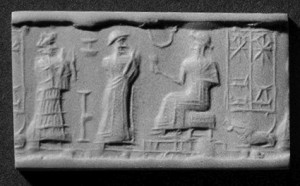
(Aya spouse Utu his father Nannar)
First, I will give birth to a girl child.
I name her Inanna, the First Daughter of the Moon,
the Morning and Evening Star (Venus, 8th planet / star found when entering into our Solar System),
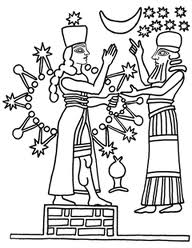 (Inanna & Enlil, (Inanna‘s 8-pointed star symbol of Venus, the 8th planet entering the solar system, Earth being lucky #7) (Enlil & his symbol of 7 planets, 7 stars, 7-pointed stars, etc., meaning his rule over Earth)
(Inanna & Enlil, (Inanna‘s 8-pointed star symbol of Venus, the 8th planet entering the solar system, Earth being lucky #7) (Enlil & his symbol of 7 planets, 7 stars, 7-pointed stars, etc., meaning his rule over Earth)
who will be the Great Goddess of Love and War, Lover and Beloved as One.
Wise, passionate, sensual, all this and more she will be.
She will be the embodiment of love, both spiritual and highly physical,
the Inner Light to bring brightness, passion, healing and fruition to all the living in all worlds.
And to give our daughter-to-be a (twin) brother, let him be a child of equal outer brightness.
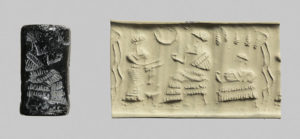 (Utu / Shamash, the Sun God, son to Nannar, & Ningal)
(Utu / Shamash, the Sun God, son to Nannar, & Ningal)
I’ll call him Utu, the Sun, the Light of the Day,
who will illuminate all worlds with clarity while you, my love, are away.
So let it be known that the Light of the Night and the Diviner of Dreams brought into being
the brightest heavenly stars to ensoul the lives of the all gods and humankind.
And as I will, so be it’.
